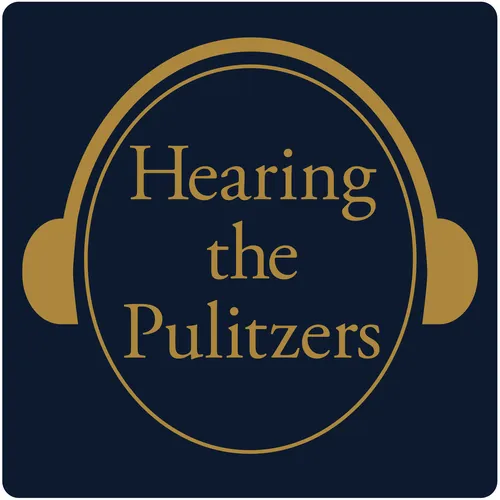
Hearing The Pulitzers
Hearing the Pulitzers: A piece-by-piece, episode-by-episode exploration of the winners of the Pulitzer Prize in Music with hosts Andrew Granade and David Thurmaier.
- Update frequency
- every 25 days
- Average duration
- 28 minutes
- Episodes
- 67
- Years Active
- 2020 - 2025

Episode 62 - 2004: Paul Moravec, Tempest Fantasy
In this episode, Dave and Andrew dive into a work inspired by Shakespeare's The Tempest. Will the work live up to the Bard's reputation? And does this piece fit into the typical mold of a Pulitzer Pr…

Episode 61 - 2003: John Adams, On the Transmigration of Souls
In this episode, Dave and Andrew go back to the events of 9/11 and listen to a piece memorializing the day. But will they find the piece moving or maudlin? And how does the piece hold up some 20+ yea…

Episode 60 - 2002: Henry Brant, Ice Field
In this episode, Dave and Andrew explore the first experimental composer to win the Pulitzer since Charles E. Ives. With that pedigree, what will they think of Henry Brant's Ice Field? And why is thi…

Episode 59 - 2001: John Corigliano, Symphony No. 2 for String Orchestra
In this episode, Dave and Andrew explore the symphony of John Corigliano they don't know. After appreciating Corigliano's first and third symphonies, what will they think of the second? This piece, a…

Episode 58 - 2000: Lewis Spratlan, Life is a Dream, Opera in Three Acts: Act II, Concert Version
In this episode, Dave and Andrew talk about a curious winner for the year 2000 since it was originally composed 25 years earlier! What will they think about this blast from the past? It's also the fi…

Episode 57 - 1999: Melinda Wagner, Concerto for Flute, Strings and Percussion
In this episode, Dave and Andrew explore a concerto featuring an instrument not often put into a concerto setting: the flute. But its title also promises a balance among three forces instead of a fea…

Episode 56 - 1998: Aaron Jay Kernis, String Quartet #2 (musica instrumentalis)
In this episode, Dave and Andrew return to the venerable string quartet for a piece that mixes tonality, modernist music, Baroque dances, and Medieval modality. But will this mixture work for them?
…

Episode 55 - 1997: Wynton Marsalis, Blood on the Fields
In this episode, Dave and Andrew go deep into the tangled history surrounding the first jazz piece to ever win the Pulitzer Prize in Music, Wynton Marsalis's Blood on the Fields. But what will they t…

Episode 54 - 1996: George Walker, Lilacs for Voice and Orchestra
In this episode, Dave and Andrew discuss a song cycle in all but name, George Walker's Lilacs. From the outside, this win looks like another lifetime achievement award, but is it? And does Lilacs rem…

Episode 53 - 1995: Morton Gould, Stringmusic
In this episode, Dave and Andrew discuss a composer from an earlier generation winning a Pulitzer in the twilight of his career. What will they think of Stringmusic?
If you'd like more information…

Episode 52 - 1994: Gunther Schuller, Of Reminiscences and Reflections
In this episode, Dave and Andrew discuss one of the composers Dave wishes he had met, Gunther Schuller. But does Schuller's winning work Of Reminiscences and Reflections live up to his high expectati…

Episode 51 - 1993: Christopher Rouse, Trombone Concerto
In this episode, Dave and Andrew consider one of the few concertos to win the Pulitzer Prize, this time for an instrument whose sound some critics claimed grew "tiresome." Will they agree? And what f…

Episode 50 - 1992: Wayne Peterson, The Face of the Night, The Heart of the Dark
In this episode, Dave and Andrew address one of the most controversial awards in Pulitzer history. What happened in 1992 and was Wayne Peterson's music worthy of the ruckus that grew around it?
I…

Bonus: An Interview with Howard Pollack
In this episode, Dave and Andrew are joined by Howard Pollack, John and Rebecca Moores Professor of Music at the University of Houston. Dr. Pollack is the author of acclaimed biographies of several P…

Episode 49 - 1991: Shulamit Ran, Symphony
In this episode, Dave and Andrew explore the second Pulitzer Prize in music won by a female composer, Shulamit Ran for her Symphony, in 1991. What will they think about this fourth freely-atonal work…

Episode 48 - 1990: Mel Powell, Duplicates
In this episode, Dave and Andrew explore a composer who played with Benny Goodman as a jazz pianist, and then embraced Arnold Schoenberg's musical ideas as a member of the academy. What kind of music…

Episode 47 - 1989: Roger Reynolds, Whispers Out of Time
In this episode, Dave and Andrew explore a work for string orchestra that Kyle Gann opined was the first experimental composition to win the Pulitzer since Charles Ives. Given how much Dave loves Ive…

Bonus: An Interview with William Bolcom
In this special bonus episode, Dave and Andrew talk with 1988 Pulitzer Prize Winner William Bolcom. What is the difference between the Etudes and the New Etudes? What impact did John Cage have on his…

Episode 46 - 1988: William Bolcom, Twelve New Etudes
In this episode, Dave and Andrew discuss the first solo piano work to ever win a Pulitzer Prize. And they try to answer the question–if these are "new" etudes, what are the "old" etudes? They also ex…

Bonus: An Interview with John Harbison
In this special bonus episode, Dave and Andrew talk with Pulitzer Winner John Harbison. Why did he decide to play the tuba? What was it like to study composition with two-time winner Walter Piston? W…